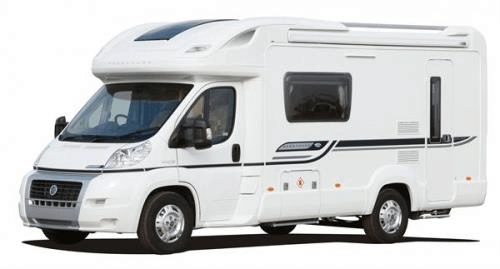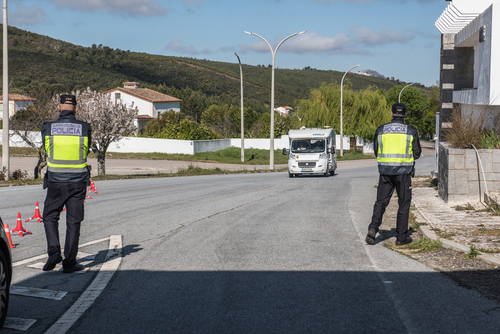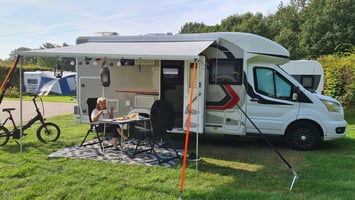There’s nothing quite like the freedom of the open road, the thrill of a new destination on the...
Sadly, motorhome travellers are all too often seen as ideal targets by scammers across Europe - perhaps due to their perceived valuables held on board, their unfamiliarity with the local customs or language, and maybe because they are in holiday mode. We’ve heard a few stories over the years about people that have been stopped in Europe for various reasons, and have then unfortunately been burgled when distracted, or even had their motorhome stolen from them.
Below we detail some of the scams we have either heard or read about, followed by some of the best ways to prevent any of them from happening to you when travelling abroad.
1. Scammers asking for information, or for directions…
This one often concerns pickpockets, who either stop you by your motorhome and ask for directions or something similar, whilst an accomplice enters your unlocked motorhome and steals something. They also have been known to ask the same things by leaning in to talk to you via your window whilst you are sat in the cab - they can use a large map to cover their hands whilst stealing your handbag or phone from beside you - even from that little opening.
Another one we have heard of is a group of children surrounds your vehicle, sometimes pretending to sell something or ask for money. Meanwhile, one of them sneaks a hand inside a window or door to snatch any loose items.
What to do:
Keep items such as phones, wallets and bags away from the windows - put them in the middle of the cab or lock them away. Make sure they are hidden when driving, and when you have stopped and are pottering about, in and around your motorhome. If your gut instinct tells you not to stop and help someone, that’s ok - listen to it.

2. Scammers loosening or damaging items on the motorhome
Some thieves operate at rest stops, especially overnight. They may puncture your tyres and then follow you to ‘help’ you when you break down. It has also been known for scammers to loosen items such as bikes and cover straps, so that you have to pull over to sort the issue out.
What to do:
Be sure to walk round your motorhome before setting off - check the bike rack and cover is secure, check the storage areas are all still locked and that nothing is loose on the motorhome. Check the tyres for any issues, too.
3. Scammers flagging you down to say there’s something wrong with your vehicle
It has been known for thieves to pass you in their vehicle to flag you down or point at your motorhome, gesticulating that there’s smoke, a flat tyre, or something hanging loose from your motorhome. When you pull over to check, an accomplice distracts you while another sneaks inside to grab your valuables. If you’ve got out, either the driver’s door or the passenger door can be opened and then entered, and things stolen. They may even try to take the keys of the motorhome, so keep them on you at all times.
What to do:
If you’ve looked in the side mirrors and nothing seems amiss, and you haven’t felt like you’ve got a puncture, then it might be best to wait until the next available rest point to take a look. Don’t stop if you think it’s unsafe to do so. If the car sees that you are not pulling over, they will hopefully disappear quite quickly.
4. Scammers flagging you down to say there is something wrong with their vehicle
In an opposite way, some people that are up to no good might flag you down at the roadside, suggesting that they need help with a broken down car or suchlike.
What to do:
Obviously everyone needs help at some point in their life, but again, if your gut tells you something is up, listen to it. If you do stop to help, lock your motorhome and make sure no valuables are on show, and that you keep an eye on your wallet and your phone if they are on your person.

5. Scammers pretending to be the police
It has been known for fraudsters to pose as plain clothes police officers, stopping your vehicle (usually in an unmarked car) and flashing fake badges, accusing you of a minor traffic offence or drug possession, for example. They’ll ask to see your wallet or passport, claiming it’s part of their ‘search’ and then drive off with it.
What to do:
This is a tricky one, but if you think it’s dodgy, try to get someone in the motorhome to call the local police and see if it is legitimate. If you are worried, you might need to think about driving to the nearest police station and sorting it out there, or at least a service station. It’s a good idea to carry the emergency numbers for the country you are travelling in before you set off. Dialling 112 in the EU works like it would in the UK, and is an emergency number that reaches the emergency services in nearly all EU countries.
Phew! That’s a lot of potential scams to be aware of. Below, we’ve got some general advice to avoid falling victim to these and any similar scams:
Always keep your doors locked
Even when you’re inside or just stepping out for a moment, lock all the doors - motorhome break-ins often happen within seconds.
Don’t stop for unmarked or suspicious vehicles
If someone in plain clothes flags you down or pretends to be the police, drive to a well-lit, busy area or service station. Legitimate police will often have marked cars and will not object to you asking to see full identification, or calling the emergency services to confirm.
Hide your valuables
Never leave items such as passports, wallets, or tech visible through the windows. Use a safe or hide them in less obvious places like food containers or under the furniture.
Be sceptical of strangers at the roadside
It’s ok to be kind, but do be cautious. You could offer to call roadside assistance for them instead of getting out, or letting them near your vehicle.
Install a dash cam or external camera
These not only deter scammers but also provide crucial evidence if you’re targeted.
Avoid sleeping at isolated rest stops
If possible, try to choose secure campsites or well-reviewed motorhome aires. Look for those with CCTV, lighting and other motorhomes nearby.
Take photos of ‘officials’
If someone claiming to be an authority figure approaches you, take a photo of them and their vehicle. Scammers will often back off quickly if they know they’re being documented.

Travelling to Europe by motorhome can be an incredible experience but it’s so important to be informed and vigilant, as this is your best defence against these types of scams. You want to come back with a lovely holiday memory, not a holiday nightmare to deal with.
Do you have any tips or experiences to share? Let us know in the comments!








